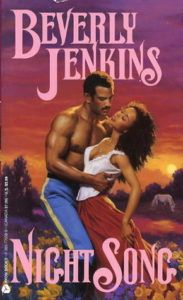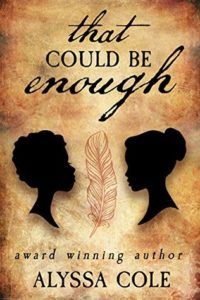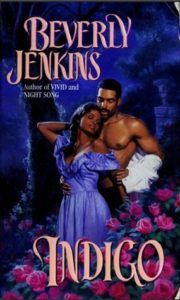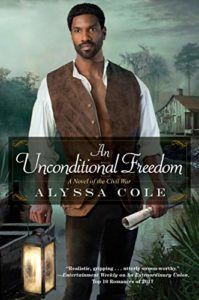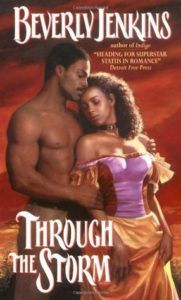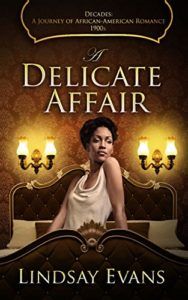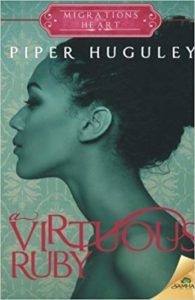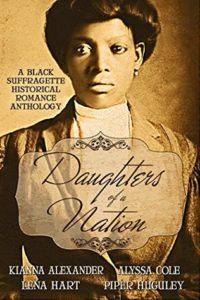Just over a quarter of a century has passed since Jenkins published her first novel, Night Song. That book, and the 39 others she published since then, changed the game. To celebrate that milestone and the many great books that have come along since then, I compiled a list of 15 of the best Black historical romance novels of each period.
Legacy and Change
The books on this list represent both lasting legacies and forward change. They include family sagas by Jenkins as well as novels, novellas, and short stories by writers charting new directions. One of the most prolific authors, Alyssa Cole, has written novels and novellas on an expansive range of events spanning several centuries. Cole and others are expanding the range of what Black protagonists of historical romance can look like in terms of their sexuality and what a loving relationship looks like.
common Ground
Still, these Black-authored historical romance novels share several traits that are common in the black historical romance subgenre. First, they deliver on the joy and promise of true love and happy endings for all that form the heart of the romance genre. Second, they center Black history and Black people in solidarity with each other. Third, they embrace the values of Dr. King’s ideal of the beloved community, one based on justice and love of one’s fellow human beings. The majority of these books also center Black love, a designation reserved for love stories in which all the parties in the relationship are Black. That’s both representative of the historical context and an important symbolic distinction. While interracial relationships are often associated with multiculturalism, for many readers celebrating Black love is an important form of self-affirmation, one that recognizes the beauty of Blackness in its own right. Black love stories are especially meaningful in an industry which often fails to recognize black humanity unless accompanied and approved by the White majority.
Must-Read Black Historical Romance Novels 1994-2019
The Post-Revolutionary Period
As the New York Times’ 1619 project underscores, Africans have lived in the Americas for more than 400 years. Yet, the stories we read about Black history tend to cluster around a much shorter expanse of time. That is just one reason That Could be Enough by Alyssa Cole is special. This novella would be a stand out in any age, but stories about Black life in the revolutionary period are less plentiful than those about other subjects. Stories that center two Black women in love even less so. As a result, this novella is a particular treat. Cole initially conceived That Could Be Enough as part of Hamilton’s Battalion, a trio of diverse, queer historical romances inspired by the Broadway Musical Hamilton. In 1820, Mercy Alston, an African American woman, has been working in Eliza Hamilton’s household for 10 years, first as a servant and now as the widow’s assistant in her quest to protect her husband’s historical legacy by collecting the stories of those who served with him. It’s in this capacity that Mercy meets and falls dangerously in love with Andromeda, a spirited dressmaker who’s there to share her grandfather’s story. The two are opposites in temperament and outlook. As an orphan, Mercy has been used to protecting herself and being on her own. Her negative experiences with a former lover have only made her harder and more closed off. In Mercy’s view, love “took more than it gave,” and her employer has sacrificed too much for her husband. Andromeda, on the other hand, is a lighter, more optimistic figure who has strong community ties and is devoted to her fellow Black women. She turns Mercy’s life upside down in the best way.
The Underground Railroad
The Underground Railroad is one of the best known and most celebrated aspects of Black American history. It’s only fitting then that Indigo, which depicts some of the saviors on that network, is likely the best-known and most beloved African American historical romance. It’s also a quintessential Beverly Jenkins’ creation. Jenkins’ body of work runs the gamut in terms of subgenres. She does adventure as well as the everyday domestic drama. Nonetheless, her books share certain hallmarks: they center heroines who are fiercely independent, they have jobs and in many cases are committed to careers doing the kind of uplift that was essential in earlier, first wave historical romance. What makes this work special is that while Ms. Bev as she’s known to fans, is a stickler for period detail and fills her stories with social and political current events and issues, her stories are always deeply romantic, sexy, viscerally satisfying entertainment. Indigo epitomizes that special Jenkins alchemy. Like most of her books, it is richly detailed and political. Protagonists Hester and Galen are abolitionists, conductors on the underground railroad, who have dedicated and risk their lives to help enslaved people to freedom. But Indigo is most famous for the incredible chemistry between the leads and the absolute breathtaking devotion of Black Daniel (as he’s known in his activist persona) for his Hester despite the social conventions of the time that say a dark-skinned former slave like her is no match for an aristocratic Creole man like him.
The Civil War (1861-1865)
This was the great conflagration of American history and is still its most contentious. No matter that the war ended 155 years ago or that the overwhelming consensus and evidence affirms the cause of the split was slavery. Some factions continue to dispute what the war was about and how those on the losing side should be remembered. The following Black historical romance novels bring those issues to life. This seems incredibly relevant in our current context. Even with the abundance of good writing on the Civil War, An Unconditional Freedom stands out (2019, Loyal League Series, Book 3). It confronts the psychological ravages of slavery through two main characters, Daniel and Janeta. Both are singular creations. Vulnerable, ignoble, and valiant at different times, they resemble few characters inside or out of the genre. Daniel is a former law clerk with deep psychological scars. He was kidnapped, sold into slavery illegally down South, and eventually liberated by friends. In the wake of all that, he fights for freedom as a Union spy, but still suffers the ravages of that trauma. Readers will recognize what Daniel suffers as PTSD and a near constant, low simmering rage. Daniel’s love interest Janeta is a new colleague in this endeavour. Despite her relative privilege, she has her own hidden scars to contend with. Many characters are flawed, but Janeta is as ambivalent a character as I’ve ever seen, and that is part of the unpredictable beauty of this book. Identity Crisis That ambivalence is one of An Unconditional Freedom‘s defining and most unique features. Racial solidarity has usually been an essential character trait for protagonists in African American historical romance. Black women are soldiers in the service of uplifting the race. It’s part of what makes them good. Janeta, however, feels no such allegiance. Being Black isn’t even part of her self-concept, so how could she feel a sense of political cohesion? Janeta has brown skin, but she is also the privileged, mixed race daughter of a wealthy slave-holding family in Cuba. She grew up on a plantation her father owned. Both parents raised her to hold herself apart from the people who looked like her. In fact, this attitude is so ingrained that when the action begins, she’s loyal only to her family and carrying on an affair with a Confederate officer. Even when she begins to sympathize with the Loyal League, her loyalties remain divided. For a long time, Janeta struggles to reconcile the degrading, self-serving lies her parents told her about Black people and the Confederate cause with the realities she sees in the American South. On this topic, Alyssa Cole works miracles. She transforms a pampered Confederate collaborator into a fearless, righteous heroine that the reader feels for and can root for enthusiastically. This would be a fantastic Book Club pick.
Also Recommended:
An Extraordinary Union and A Hope Divided by Alyssa Cole are books 1 and 2 in the Loyal League series. Each one can be read on its own.
Reconstruction (1865 – 1877)
Reconstruction was supposed to be a period of rebuilding after the Civil War and enfranchisement for the formerly enslaved. Instead, it turned into a nightmare of Jim Crow laws and racial terrorism against Blacks which led much of the South’s Black population to the Great Migration north And westward. These books capture that duality of this period poised precariously between hope and despair. Beverly Jenkins knows the fraught politics of Reconstruction, and she uses this history to drive the plot of several of her novels. In Through the Storm, one of her best, Sable, a former enslaved woman, meets and falls in love with Raimond LeVeq, an aristocratic Black Union officer (and best friend of Indigo’s Black Daniel), in a “contraband” or refugee camp during the Civil War. Sable is on the run and protecting her freedom is her highest priority. So despite their combustible connection, when a slave catcher comes looking for her in the camp, Sable runs, leaving Raimond in a vulnerable position. When they’re reunited in New Orleans some time later, Sable is again strongly attracted to Raimond, but she’s more committed to making an independent and purpose-driven life. Plus, both Raimond and Sable Both devote most of their time to helping freedmen, women and children in the face of incredible opposition after the war. Sable is being hunted by people connected to her former owners. This is classic Jenkins. Through the Storm seamlessly weaves together historically accurate storylines involving corruption in the Freedmen’s Bureau, racial divisions in the Republican Party after the war, and the rise of White vigilante groups alongside a passionate central love story.
Also recommended:
Both The Preacher’s Promise by Piper Huguley and Rebel by Jenkins take place just after the Civil War. And both follow educated Black women from the North who move South determined to do their part to uplift the race. In The Preacher’s Promise, Amanda Stewart, a recent Oberlin graduate, starts her own school in the Black community of Milford, Georgia. There she meets, locks horns, and eventually falls in love with Virgil, the town’s mayor. Virgil used to be enslaved. He understandably harbors more than a little hesitation about Amanda’s relative privilege and origins. Critics praise this novel for its gorgeous writing and compelling, original love story. Rebel attracts similar praise, and has quickly become a reader favorite since its release in 2019. Its heroine, Valinda Lacey, is a spirited schoolteacher who moves from New York to New Orleans to help the newly freed make a better life for themselves. She quickly runs into opposition, however. Whites want to stop her from teaching Black people to read by any means necessary. Creoles don’t want their children associating with those of former slaves. She finds a champion, ally, and eventual lover, in Drake LeVeq, the bachelor architect from an old wealthy local family. Though Drake’s family is Creole, they don’t subscribe to the classism and colorism to which others in the community hold fast. This book has earned its adoration and accolades. It’s a great love story and a multilayered, richly researched history lesson as well.
The Great Migration
Like the Great Migration itself, these narratives are a varied lot. They encompass the movement of African Americans out of the Black Belt states of the South and into the North, Midwest, and Western United States. Some are Westerns. They depict the adventures of people moving into untamed frontier areas of Wyoming and Montana or to California. Others focus on the new lives these migrants forged and the challenges they faced in Northern cities like New York and Chicago. There are so many great Black historical romance novels on this topic it is hard to choose just a few. In A Delicate Affair by Lindsay Evans, a beautiful Black debutante bound for Radcliffe College meets a musician who’s recently migrated to Washington D.C. to escape from mob violence in the south. Leonie isn’t looking for a relationship. Golden isn’t looking for trouble. He just wants to make music and live in peace for a change. Despite their differences, each one finds the other hard to resist. A Delicate Affair (Decades Series, Book 1, 1900s) is one of best-selling contemporary romance author Katrina Jackson’s favorite historicals as is The Art of Love by Suzette D. Harrison (Decades, Book 4, 1930s). Along with Love’s Serenade by Sheryl Lister, which is set in Harlem’s vibrant jazz scene in the 1920s, these books are part of the well-reviewed Decades* series created by Wayne Jordan. Each installment focuses on African American life in a different decade of the 20th century. The whole series, but these books in particular, are deserving of much greater attention.
Also recommended: A Virtuous Ruby By Piper Huguley
A Virtuous Ruby by Piper Huguley is a grittier but engrossing and richly researched story of two mixed-race people beset by major hardship and abuse who find solace in each other and in their Christian faith. The story is set in a small town in Georgia in 1915. One of the realities this novel exposes goes contrary to the dictates of the genre, but is true to the time: given the racial regime they’re living under, the hero is himself vulnerable and unable to fully protect the woman he loves. Vivid by Beverly Jenkins, is about a pioneering female doctor who falls in love with the hardened, long-divorced mayor of a small, All-Black settlement town in Michigan. Like many histrom heroines, Dr. Vivica Lancaster prizes her career and serving the community above all. As a recent medical school graduate and the only doctor for miles around, life is demanding enough. She isn’t interested in love or marriage. Vivid’s potential love interest, the mayor, is also a skeptic about romantic love. The story is largely about how they move beyond those preconceived positions. Jenkins based her story on the fascinating true history of the first African-American women doctors in the 19th century.
Women’s Suffrage (Late 19th to Early 20th Century)
Daughters of a Nation: A Black Suffragette Historical Romance Anthology is a collection of four stories about the often overlooked role Black women played in the fight for voting rights for all women. In “The Washerwomen’s War” by Piper Huguley, Mamie Harper, a new teacher at a seminary in Atlanta, is the daughter of a famous Black Suffragette and a fledgling leader in her own right. When she learns that her students who work as laundresses are being mistreated, she organizes a strike. That action places her directly in the path of Pastor Gabriel Harmon, a man she had previously rejected. This story weaves together this under-studied history with a classic rivals to lovers storyline. NPR book critic Maya Rodale picks this as one of the best in its class. The Daughters of a Nation anthology also features “Let Us Dream” by Alyssa Cole. Harlem nightclub owner Bertha Hines is a formidable businesswoman, activist, and former sex worker. In 1917, Bertha faces opposition in multiple spheres. Men feel uncomfortable with a woman like her having power. Other Black women in the Suffrage movement worry about the respectability of the women in their ranks. Yet, none of that keeps her from campaigning for the rights of sex workers right alongside the right to vote. Bertha also tutors her workers in civics so they can advocate for their own interests. (Let Us Dream is also available as a novella.) In the midst of all of this, Bertha meets Amir, a handsome and mysterious new employee. For once the tables turn. Bertha becomes the student. Amir, who originally hails from India, teaches her a more authentic version of the Indian dances she sometimes performs. More importantly, he shows her how to be on the receiving end of care. With that, Cole makes Bertha a still heroic yet multifaceted and vulnerable figure.
Happy ever after for all
Also recommended: Destiny’s Surrender by Beverly Jenkins
Jenkins also addresses classism and stigma against women who do sex work in her books. Destiny’s Surrender, which takes place in California in the late 19th century, is one of the best. In this installment of a three part family saga, Billie and Drew have a long-standing and loving relationship. Their beginning as client and customer, however, sows distrust. Plus, their difference in class worsens the gap. As Billie is well aware, were it not for an accident, Drew would surely have married someone else. A strong element of suspense and mystery further complicates the central love story. Let Us Dream and Destiny’s Surrender demonstrate one of the best developments in the evolution of Black historical romance novels. Like other recent novels, they retain the social justice frame of their predecessors, but rebuke respectability politics. In the past, convention would have prevented women like Bertha and Billie from taking center stage. Many would not have seen them as heroines or people worthy of an HEA. These Black historical romance novels prove that times are changing. The genre’s much discussed feminism and inclusivity are real.
Black historical romance traditions in contemporary Romance: Black Lives Matter
Contemporary romance doesn’t focus as often or as explicitly on social and political context as historicals. Nonetheless, activist-centered contemporaries like those in the Dreamer Series by Adriana Herrera are taking the social justice elements of historical romance into the present day. Herrera’s third book, American Love Story, depicts the turbulent connection between two men who are more natural rivals than lovers. Patrice is a Haitian-American Black Lives Matter Activist and Professor. Easton is a White, upper class Assistant District Attorney. The romance works because Herrera serves up high heat, serious social commentary, and laughs in perfect measure. People say that newspapers are the first draft of history; this is romance’s contribution. *Editor’s Note: This post previously referred to the Decades romance series as a product of Harlequin Romance. Decades: A Journey of African American Romance is not published by Harlequin; the project launched in January 2018 as a response to a lack of Black love stories in a Harlequin historical romance series and was created by Wayne Jordan.
